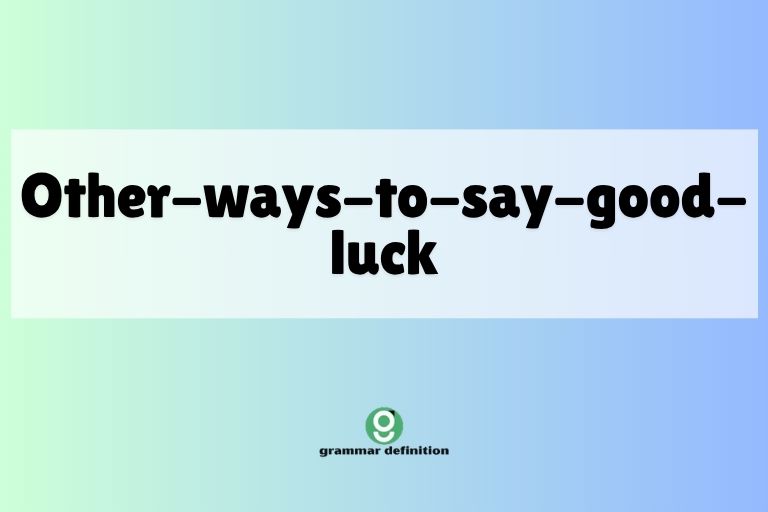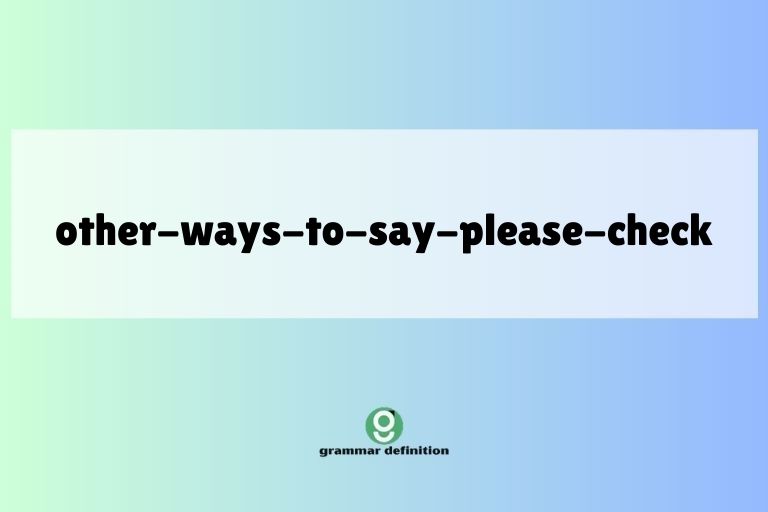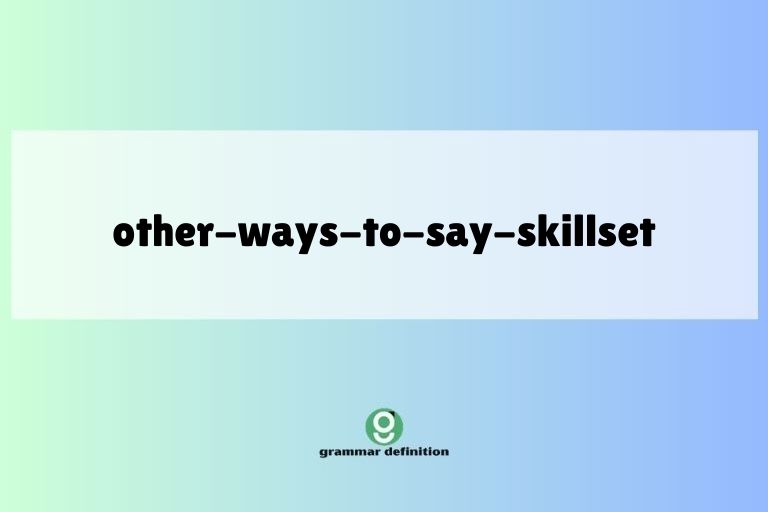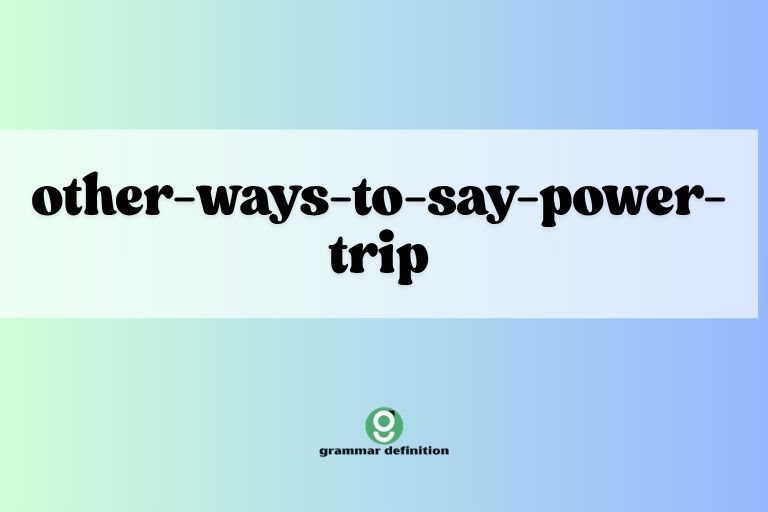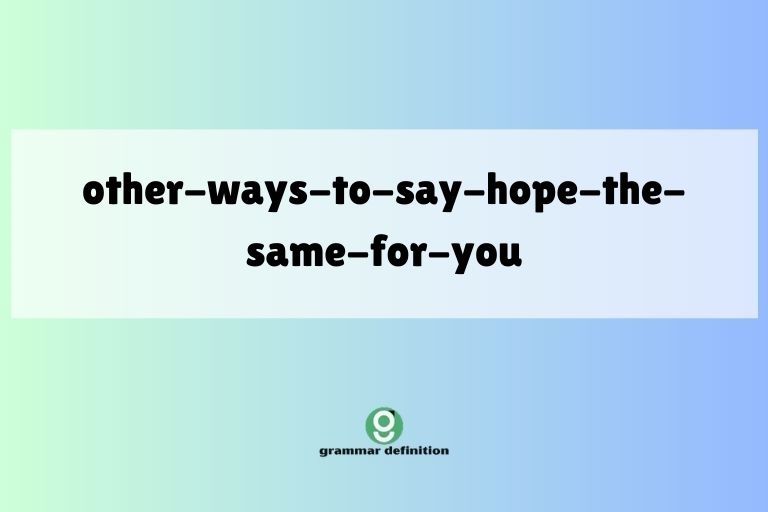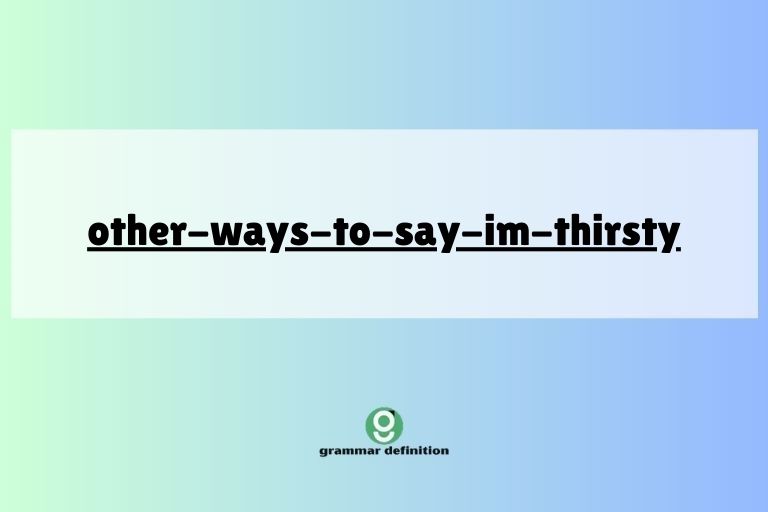Beyond “Thank You”: Creative Ways to Express Appreciation
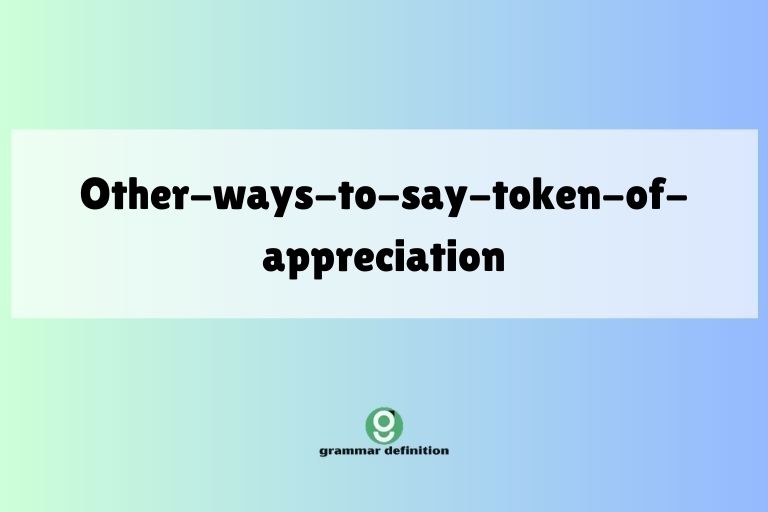
Expressing appreciation is a fundamental aspect of human interaction. While a simple “thank you” is always appropriate, expanding your vocabulary to include more nuanced and creative expressions can significantly enhance your communication skills.
This article explores a wide range of alternative phrases and expressions that convey gratitude in various contexts. Whether you’re writing a formal letter, giving a speech, or simply engaging in casual conversation, understanding these alternatives will allow you to express your feelings more effectively and sincerely.
This guide is beneficial for English language learners, writers, educators, and anyone looking to refine their communication skills and enrich their vocabulary.
By mastering these phrases, you’ll be able to articulate your gratitude with greater precision and impact, leaving a lasting positive impression on those you interact with.
Table of Contents
- Introduction
- Definition: Token of Appreciation
- Structural Breakdown of Appreciation Phrases
- Types and Categories of Appreciation Expressions
- Examples of Appreciation Expressions
- Usage Rules for Appreciation Expressions
- Common Mistakes in Expressing Appreciation
- Practice Exercises
- Advanced Topics in Expressing Appreciation
- Frequently Asked Questions
- Conclusion
Definition: Token of Appreciation
A “token of appreciation” is a tangible or intangible gesture that expresses gratitude or recognition for someone’s actions, efforts, or qualities. It can range from a simple verbal acknowledgment to a more substantial gift or reward.
The primary function of a token of appreciation is to convey sincere gratitude and to reinforce positive behavior or contributions. It serves as a symbol of acknowledgment, demonstrating that the recipient’s efforts are valued and recognized.
The term encompasses various forms of gratitude, including verbal acknowledgments, written notes, small gifts, or even acts of service. The significance of the token lies not necessarily in its monetary value but in the thoughtfulness and sincerity behind it.
Context plays a crucial role in determining the appropriate expression of appreciation. For instance, a formal business setting might call for a written letter of commendation, while a casual friendship might warrant a simple, heartfelt “thank you” or a small, thoughtful gift.
Structural Breakdown of Appreciation Phrases
Appreciation phrases can be structurally diverse, ranging from simple expressions to complex sentences. Understanding the basic components of these phrases can help you construct your own expressions of gratitude more effectively.
Here’s a breakdown of common structural elements:
- The Acknowledgment: This is the core component that directly states your gratitude. Examples include “Thank you,” “I appreciate,” or “I’m grateful for.”
- The Reason: Specifying why you are grateful adds depth and sincerity to your expression. Examples include “for your help,” “for your time,” or “for your support.”
- The Impact: Describing the positive impact of the recipient’s actions further emphasizes your appreciation. Examples include “it was a great help,” “it made a big difference,” or “I couldn’t have done it without you.”
- The Follow-Up: Adding a follow-up statement can reinforce your gratitude and strengthen the relationship. Examples include “I value your contribution,” “I look forward to working with you again,” or “I’m truly fortunate to have you.”
By combining these elements, you can create a wide range of appreciation phrases that are both meaningful and appropriate for various situations. For instance, a simple “Thank you for your help” can be expanded to “I truly appreciate your help; it made a big difference, and I’m very grateful.” This more detailed expression conveys a stronger sense of gratitude and acknowledgment.
Types and Categories of Appreciation Expressions
Expressions of appreciation can be categorized based on their formality, context, and level of intensity. Understanding these categories can help you choose the most appropriate expression for a given situation.
Formal Expressions
Formal expressions are typically used in professional settings, official correspondence, and situations where a high level of respect is required. These expressions are characterized by their precise language and adherence to grammatical conventions.
Examples of formal expressions include:
- “I am deeply grateful for…”
- “I extend my sincere appreciation for…”
- “I would like to express my profound gratitude for…”
- “Your contribution is greatly appreciated.”
- “We are indebted to you for…”
Informal Expressions
Informal expressions are used in casual settings, among friends and family, and in situations where a relaxed and friendly tone is appropriate. These expressions are characterized by their simple language and directness.
Examples of informal expressions include:
- “Thanks a lot!”
- “I really appreciate it.”
- “You’re a lifesaver!”
- “I owe you one.”
- “That’s so kind of you.”
Business-Related Expressions
Business-related expressions are used in professional contexts to acknowledge contributions, express gratitude for partnerships, and maintain positive relationships with clients and colleagues. These expressions balance formality with a warm and professional tone.
Examples of business-related expressions include:
- “We value your partnership.”
- “Thank you for your continued support.”
- “We appreciate your business.”
- “Your efforts have been instrumental to our success.”
- “We are grateful for your dedication.”
Personal Expressions
Personal expressions are used in intimate relationships, friendships, and family settings to convey deep gratitude and affection. These expressions are often heartfelt and sincere, reflecting the personal connection between individuals.
Examples of personal expressions include:
- “I’m so grateful to have you in my life.”
- “I appreciate you more than words can say.”
- “Thank you for always being there for me.”
- “I’m truly blessed to have you.”
- “You mean the world to me.”
Creative and Emphatic Expressions
Creative and emphatic expressions are used to convey a strong sense of gratitude in a memorable and impactful way. These expressions often involve figurative language, metaphors, and other rhetorical devices to enhance their emotional impact.
Examples of creative and emphatic expressions include:
- “I can’t thank you enough.”
- “Words can’t express how grateful I am.”
- “You’re a true gem.”
- “You’ve gone above and beyond.”
- “My gratitude knows no bounds.”
Examples of Appreciation Expressions
The following tables provide extensive examples of appreciation expressions, categorized by formality, context, and style. Each table includes a variety of phrases that can be adapted to suit different situations.
Formal Examples
This table provides formal expressions of appreciation suitable for professional or official settings.
| Expression | Context |
|---|---|
| I am deeply grateful for your invaluable assistance during this project. | Acknowledging significant help in a professional setting. |
| I extend my sincere appreciation for your unwavering support and guidance. | Expressing gratitude to a mentor or supervisor. |
| I would like to express my profound gratitude for your exceptional contribution to our team’s success. | Recognizing outstanding performance within a team. |
| Your contribution is greatly appreciated, and we value your expertise in this matter. | Highlighting the importance of someone’s skills. |
| We are indebted to you for your generous donation to our organization. | Thanking a donor for their financial support. |
| Please accept my heartfelt thanks for your dedication and commitment. | Acknowledging long-term dedication. |
| I am truly thankful for the opportunity to collaborate with you on this endeavor. | Expressing gratitude for a collaborative project. |
| Your insightful feedback has been invaluable to the improvement of this project. | Acknowledging helpful feedback. |
| We deeply appreciate your willingness to go above and beyond to meet our needs. | Recognizing exceptional service. |
| It is with sincere gratitude that I acknowledge your significant impact on our company. | Highlighting a lasting positive effect. |
| Your professionalism and expertise are greatly valued. | Acknowledging professional qualities. |
| I wish to convey my sincere thanks for your prompt and efficient service. | Expressing gratitude for quick service. |
| We are truly appreciative of your flexibility and understanding. | Thanking someone for being accommodating. |
| Your guidance has been instrumental in our success. | Acknowledging the importance of guidance. |
| I am writing to express my sincere gratitude for your assistance. | Formal letter of thanks. |
| Your support has been invaluable to our team’s progress. | Acknowledging team support. |
| We are grateful for your continued commitment to excellence. | Thanking for ongoing dedication. |
| Your insights have been particularly helpful. | Acknowledging valuable insights. |
| We value your contribution to our shared goals. | Thanking for contributing to common objectives. |
| Please accept our sincere thanks for your hard work and dedication. | Acknowledging hard work. |
| I want to formally acknowledge your outstanding achievement. | Recognizing a significant accomplishment. |
| We are deeply appreciative of your commitment to quality. | Thanking for commitment to high standards. |
| Your expertise has been a great asset to our project. | Highlighting expertise. |
| I am very grateful for your kind consideration. | Thanking for thoughtful consideration. |
| We deeply appreciate your time and effort. | Acknowledging time and effort. |
Informal Examples
This table provides informal expressions of appreciation suitable for casual conversations and personal interactions.
| Expression | Context |
|---|---|
| Thanks a lot for helping me out! | Expressing gratitude for assistance. |
| I really appreciate you being there for me. | Thanking someone for their support. |
| You’re a lifesaver! I don’t know what I would have done without you. | Acknowledging significant help in a crisis. |
| I owe you one for covering my shift yesterday. | Expressing gratitude for covering work responsibilities. |
| That’s so kind of you to offer your help. | Thanking someone for their generosity. |
| Cheers for lending me your car! | Expressing gratitude for lending something. |
| You’re the best! Thanks for always being so supportive. | Acknowledging constant support. |
| I can’t thank you enough for your advice. | Expressing deep gratitude for guidance. |
| You really went above and beyond. Thanks! | Recognizing exceptional effort. |
| I’m super grateful for your help with the party. | Thanking for help with an event. |
| Thanks a ton for the ride! | Expressing gratitude for transportation. |
| You’re a gem! Thanks for always making me laugh. | Acknowledging someone’s positive qualities. |
| I really appreciate you listening to me. | Thanking someone for listening. |
| Thanks for being such a great friend. | Acknowledging friendship. |
| I appreciate it more than you know. Thanks! | Expressing deep gratitude. |
| You’re a star! Thanks for all your hard work. | Recognizing hard work. |
| Thanks for always having my back. | Acknowledging support. |
| I really appreciate your honesty. | Thanking for honesty. |
| Thanks for being so understanding. | Acknowledging understanding. |
| You made my day! Thanks! | Expressing gratitude for a positive impact. |
| Thanks for the awesome gift! | Thanking for a gift. |
| I really appreciate you thinking of me. | Acknowledging thoughtfulness. |
| Thanks for making this so easy. | Expressing gratitude for simplifying something. |
| You’re a legend! Thanks for everything! | Expressing extreme gratitude and admiration. |
| Thanks for the heads up! | Thanking for a warning or information. |
Business-Related Examples
This table provides business-related expressions of appreciation suitable for professional communications.
| Expression | Context |
|---|---|
| We value your partnership and look forward to continued collaboration. | Expressing gratitude for a business relationship. |
| Thank you for your continued support of our company. | Acknowledging ongoing support from a client. |
| We appreciate your business and the trust you place in us. | Thanking a client for their patronage. |
| Your efforts have been instrumental to the success of this project. | Recognizing a team member’s contributions. |
| We are grateful for your dedication and commitment to excellence. | Thanking an employee for their hard work. |
| Thank you for your prompt response to our inquiry. | Expressing gratitude for quick service. |
| We appreciate your flexibility and understanding during this challenging time. | Acknowledging adaptability. |
| Your insights have been invaluable in helping us make informed decisions. | Thanking for valuable advice. |
| We are pleased to acknowledge your outstanding performance this quarter. | Recognizing excellent performance. |
| Thank you for your contribution to our company’s growth. | Acknowledging contributions to company success. |
| We appreciate your attention to detail and commitment to quality. | Thanking for diligence. |
| Thank you for your hard work and dedication to meeting our deadlines. | Acknowledging hard work and meeting deadlines. |
| We value your expertise and appreciate your willingness to share your knowledge. | Thanking for sharing expertise. |
| Thank you for your ongoing commitment to customer satisfaction. | Acknowledging commitment to customer service. |
| We appreciate your proactive approach to problem-solving. | Thanking for initiative. |
| Thank you for your leadership and guidance. | Acknowledging leadership qualities. |
| We are grateful for your positive attitude and team spirit. | Thanking for a positive attitude. |
| Thank you for your valuable input during our meetings. | Acknowledging valuable contributions. |
| We appreciate your dedication to continuous improvement. | Thanking for dedication to improvement. |
| Thank you for your exceptional service and support. | Acknowledging exceptional service. |
Personal Examples
This table provides personal expressions of appreciation suitable for use with friends, family, and loved ones.
| Expression | Context |
|---|---|
| I’m so grateful to have you in my life; you always know how to make me smile. | Expressing gratitude for someone’s presence. |
| I appreciate you more than words can say; you’re the best friend anyone could ask for. | Acknowledging deep appreciation for friendship. |
| Thank you for always being there for me, no matter what. | Expressing gratitude for unwavering support. |
| I’m truly blessed to have you as my partner; you make every day better. | Acknowledging gratitude for a romantic partner. |
| You mean the world to me, and I’m so thankful for your love and support. | Expressing love and gratitude. |
| Thank you for your unconditional love and support. | Acknowledging unconditional love. |
| I really appreciate your understanding and patience. | Thanking for understanding and patience. |
| Thank you for making me laugh every day. | Acknowledging someone’s humor. |
| I’m so grateful for your kindness and generosity. | Thanking for kindness and generosity. |
| You’re the best mom/dad/sibling/friend ever! | Expressing love and appreciation. |
| Thank you for always believing in me. | Acknowledging belief in oneself. |
| I appreciate your honesty and openness. | Thanking for honesty. |
| Thank you for your constant encouragement. | Acknowledging encouragement. |
| I’m so grateful for your support during difficult times. | Thanking for support during tough times. |
| You make my life so much richer and more meaningful. | Expressing gratitude for enriching one’s life. |
| Thank you for all the little things you do. | Acknowledging small acts of kindness. |
| I really appreciate your thoughtfulness. | Thanking for thoughtfulness. |
| You’re such a positive influence in my life. | Acknowledging a positive impact. |
| Thank you for being such a wonderful person. | Expressing appreciation for someone’s character. |
| I’m so lucky to have you in my life. | Expressing feelings of luck and gratitude. |
Creative and Emphatic Examples
This table provides creative and emphatic expressions of appreciation that go beyond simple thank yous.
| Expression | Context |
|---|---|
| I can’t thank you enough; you’ve truly saved the day! | Expressing overwhelming gratitude for saving a situation. |
| Words can’t express how grateful I am for your incredible support. | Acknowledging immense gratitude that exceeds words. |
| You’re a true gem; your kindness shines brighter than any star. | Expressing admiration and gratitude for someone’s kindness. |
| You’ve gone above and beyond, and I’m eternally grateful for your efforts. | Recognizing exceptional effort and expressing lasting gratitude. |
| My gratitude knows no bounds; you’ve made an unforgettable impact. | Expressing limitless gratitude for a significant impact. |
| You’re an absolute angel; I’m so thankful for your help. | Expressing deep gratitude and admiration. |
| I’m indebted to you for your unwavering support and guidance. | Acknowledging a significant debt of gratitude. |
| You’ve turned a difficult situation into a triumph, and I’m incredibly grateful. | Expressing gratitude for overcoming challenges. |
| I’m blown away by your generosity; thank you from the bottom of my heart. | Acknowledging overwhelming generosity. |
| You’re a true superhero; thank you for saving the day! | Expressing admiration and gratitude for saving a situation. |
| I’m eternally grateful for your friendship and support. | Expressing lasting gratitude for friendship. |
| You’ve made a world of difference, and I’m so thankful for your help. | Acknowledging a significant impact. |
| I’m overwhelmed with gratitude for your kindness and generosity. | Expressing overwhelming gratitude. |
| You’ve exceeded all expectations, and I’m incredibly grateful. | Acknowledging exceptional performance. |
| I’m forever grateful for your unwavering support and encouragement. | Expressing lasting gratitude for support. |
| You’ve brought so much joy into my life, and I’m deeply grateful. | Acknowledging joy and gratitude. |
| I’m lost for words to express my gratitude; you’re simply amazing. | Expressing gratitude that exceeds words. |
| You’ve gone above and beyond the call of duty, and I’m so thankful. | Recognizing exceptional effort and dedication. |
| I’m eternally in your debt for your help and support. | Acknowledging a significant debt of gratitude. |
| You’re a true inspiration, and I’m so grateful for your guidance. | Expressing admiration and gratitude for guidance. |
Usage Rules for Appreciation Expressions
Using appreciation expressions correctly involves understanding the nuances of context, formality, and cultural sensitivity. Here are some key rules to keep in mind:
- Consider the context: Choose expressions that are appropriate for the situation. Formal settings require more formal language, while casual settings allow for more relaxed expressions.
- Be sincere: Ensure that your expressions of gratitude are genuine and heartfelt. Insincere expressions can be counterproductive and damage relationships.
- Be specific: Mention the specific actions or qualities you are grateful for. This adds depth and sincerity to your expression.
- Use appropriate body language: Non-verbal cues, such as eye contact, a smile, and a warm tone of voice, can enhance the impact of your expressions of gratitude.
- Be mindful of cultural differences: Different cultures have different norms regarding the expression of gratitude. Be aware of these differences and adjust your expressions accordingly.
- Avoid overuse: While expressing gratitude is important, avoid overusing certain phrases, as this can diminish their impact.
- Personalize your expressions: Tailor your expressions to the individual and the situation. This shows that you have put thought into your expression of gratitude.
By following these rules, you can ensure that your expressions of appreciation are both effective and appropriate, fostering positive relationships and enhancing communication.
Common Mistakes in Expressing Appreciation
Even with a good understanding of appreciation expressions, it’s easy to make mistakes. Here are some common errors to avoid:
| Incorrect | Correct | Explanation |
|---|---|---|
| “Thanks for everything, I guess.” | “Thank you for everything; I really appreciate it.” | The original lacks sincerity and sounds dismissive. |
| “Appreciate it.” | “I appreciate your help.” | The original is too brief and lacks context. |
| “I’m grateful, but…” | “I’m grateful for your help, and…” | Avoid negating your gratitude with a “but.” |
| “Thanks, whatever.” | “Thank you; I appreciate what you’ve done.” | The original is disrespectful and insincere. |
| “I owe you.” | “I owe you one. Thanks for your help!” | Adding context and enthusiasm makes it more genuine. |
| “Thanks, I suppose.” | “Thank you; I really appreciate your effort.” | The original sounds reluctant and ungrateful. |
| “I appreciate it, no big deal.” | “I appreciate it; it was a great help.” | Downplaying the impact diminishes the gratitude. |
| “Thanks, but…” | “Thank you, and I also wanted to say…” | Avoid using “but” to negate the gratitude. |
| “Appreciate you.” (In formal settings) | “I appreciate your contribution.” | “Appreciate you” is too informal for formal contexts. |
| “Thanks, it’s fine.” | “Thank you; it was very helpful.” | “It’s fine” diminishes the gratitude. |
Avoiding these common mistakes will help you express your gratitude more effectively and sincerely.
Practice Exercises
Test your understanding of appreciation expressions with these practice exercises. Choose the most appropriate expression for each scenario.
- Scenario: A colleague helps you complete a difficult task.
Options:- “Thanks.”
- “I really appreciate your help; I couldn’t have done it without you.”
- “Whatever.”
Answer: b
- Scenario: A friend lends you money when you’re in need.
Options:- “I owe you.”
- “I owe you one; thanks so much for lending me the money.”
- “Fine, thanks.”
Answer: b
- Scenario: Your boss gives you a positive performance review.
Options:- “Thanks.”
- “I appreciate the positive feedback; I’m committed to continuing to improve.”
- “Okay.”
Answer: b
- Scenario: A stranger helps you carry groceries.
Options:- “Thanks, I guess.”
- “Thank you so much for your help; that was very kind of you.”
- “Whatever, thanks.”
Answer: b
- Scenario: A family member supports you through a difficult time.
Options:- “I’m grateful.”
- “I’m so grateful for your support; I don’t know what I would have done without you.”
- “It’s fine.”
Answer: b
- Scenario: A client provides positive feedback on your work.
Options:- “Okay.”
- “Thank you for your positive feedback; we appreciate your business.”
- “Whatever.”
Answer: b
- Scenario: A colleague covers your shift when you’re sick.
Options:- “I owe you.”
- “I owe you one; thank you so much for covering my shift.”
- “It’s fine.”
Answer: b
- Scenario: A friend gives you a thoughtful gift.
Options:- “Thanks.”
- “Thank you so much for the thoughtful gift; I really appreciate you thinking of me.”
- “It’s okay.”
Answer: b
- Scenario: Your mentor provides valuable career advice.
Options:- “I’m grateful.”
- “I’m deeply grateful for your advice; it will really help me in my career.”
- “Whatever.”
Answer: b
- Scenario: A stranger returns a lost item.
Options:- “Thanks.”
- “Thank you so much for returning my item; I really appreciate your honesty.”
- “It’s fine.”
Answer: b
Fill in the Blanks:
- I ______________ your help with the project. (appreciate)
- Thank you __________ much for your support. (so)
- I am __________ grateful for your kindness. (truly)
- We __________ your business and look forward to working with you again. (value)
- I __________ you being there for me. (appreciate)
- Thank you __________ much! (very)
- I am __________ thankful for your assistance. (extremely)
- We are __________ for your dedication. (grateful)
- I __________ your understanding and patience. (appreciate)
- Thank you __________ being such a great friend. (for)
Answers:
- appreciate
- so
- truly
- value
- appreciate
- very
- extremely
- grateful
- appreciate
- for
Advanced Topics in Expressing Appreciation
For advanced learners, delving deeper into the art of expressing appreciation involves understanding subtle nuances and cultural contexts. This includes mastering the use of figurative language, such as metaphors and similes, to add depth and creativity to your expressions.
For instance, instead of simply saying “Thank you for your help,” you might say “Your help was like a beacon in the dark,” conveying a stronger sense of gratitude and admiration.
Another advanced topic is understanding the cultural variations in expressing appreciation. What is considered an appropriate expression in one culture may be perceived differently in another.
For example, in some cultures, direct and explicit expressions of gratitude are highly valued, while in others, more subtle and indirect expressions are preferred. Developing cultural sensitivity in expressing appreciation can significantly enhance your communication skills and foster stronger relationships across diverse cultural backgrounds.
Frequently Asked Questions
- What is the best way to express appreciation in a formal setting?
In a formal setting, it’s best to use precise and respectful language. Phrases like “I am deeply grateful for your assistance” or “Your contribution is greatly appreciated” are appropriate. A written letter of appreciation can also be very effective in formal contexts.
- How can I make my expressions of gratitude more sincere?
To make your expressions of gratitude more sincere, be specific about what you are grateful for. Mention the specific actions or qualities you appreciate, and explain the positive impact they had. Also, use a warm and genuine tone of voice.
- Is it appropriate to give a gift as a token of appreciation in a business setting?
Giving a gift in a business setting can be appropriate, but it’s important to consider the company’s policies and cultural norms. Small, thoughtful gifts are generally
appropriate, while extravagant gifts may be seen as inappropriate or even unethical.
- How do I express appreciation to someone who doesn’t like being thanked?
Some people feel uncomfortable with direct expressions of gratitude. In such cases, you can express your appreciation indirectly by acknowledging their efforts in a subtle way or by offering reciprocal help. A simple nod or a quiet “I noticed your hard work” can be effective.
- What are some creative ways to express appreciation in writing?
In writing, you can use metaphors, similes, and anecdotes to make your expressions of gratitude more vivid and memorable. For example, instead of saying “Thank you for your support,” you could write “Your support has been the wind beneath my wings.”
Conclusion
Mastering the art of expressing appreciation is an invaluable skill that can enhance your personal and professional relationships. By expanding your vocabulary beyond simple “thank you” phrases and understanding the nuances of context, sincerity, and cultural sensitivity, you can effectively convey your gratitude in a meaningful and impactful way.
Remember to be specific, genuine, and mindful of the recipient’s preferences and cultural background. With practice and attention to detail, you can transform your expressions of appreciation into genuine tokens of gratitude that leave a lasting positive impression.

